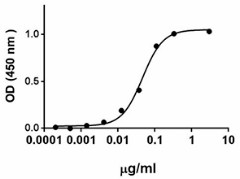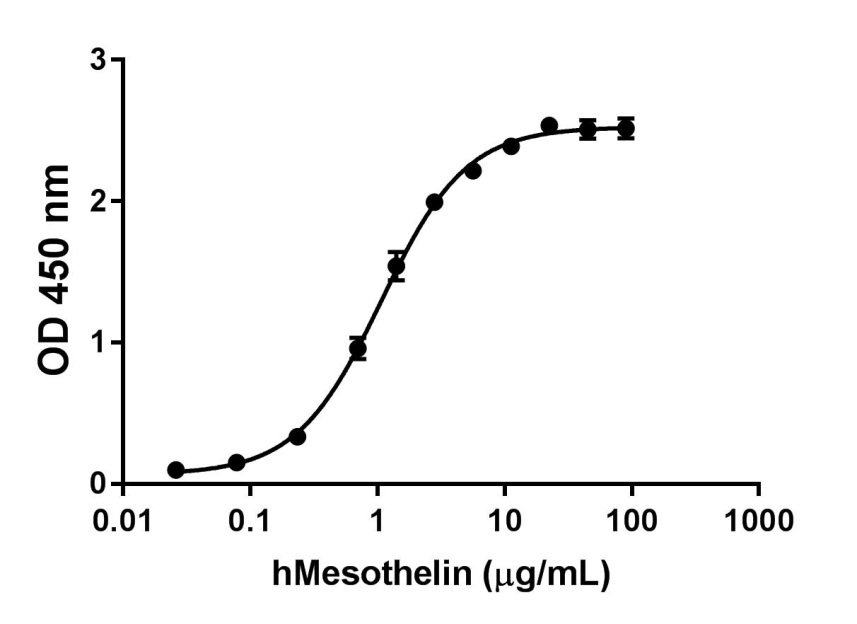- Regulatory Status
- RUO
- Other Names
- Antigen recognized by antigen K1, megakariocyte potentiating factor (MPF), soluble MPF, mesothelin releated protein, MSLN
- Ave. Rating
- Submit a Review
- Product Citations
- publications

-

Mouse mesothelin binds to immobilized human CA125/MUC16.
Mesothelin (MSLN) was initially cloned from a library of human pancreatic cancer cells. It was also identified by a monoclonal antibody, MAb K1, which recognized a glycoprotein present on the surface of mesothelial cells. Mouse and human mesothelin are 69% identical. Mouse MSLN gene encodes a ~71 kD precursor protein of 625 amino acids. The C-terminal glycosylphosphatidylinositol (GPI) anchor addition signal is removed and replaced with a GPI anchor. The MSLN precursor is cleaved by furin into two products, a ~31 kD mature megakaryocyte potentiating factor and a ~40 kD GPI-anchored membrane-bound mature mesothelin. The 40 kD GPI-anchored mesothelin can be released by treatment with phosphatidylinositol-specific phospholipase C. Soluble mesothelin specifically binds to ovarian carcinoma cell line OVCAR-3, mediated by the cancer antigen 125 (CA125), a mucin-like glycoprotein on the surface of tumor cells. CA125 and mesothelin are co-expressed in advanced grade ovarian adenocarcinoma, and it has been speculated that CA125 might contribute to the metastasis of ovarian cancer to the peritoneum by initiating cell attachment to the mesothelial epithelium via binding to mesothelin. Also, mesothelin and CA125/mucin 16 (CA125/MUC16) are co-overexpressed at the invading edges of pancreatic cancer tissues, and their expression correlates with poor survival rates. Mesothelin expression in the mouse embryo is high on days 7 and 17 of gestation, but absent on day 11 and low on day 15, suggesting developmental regulation. Nevertheless, mesothelin function is not essential for growth or reproduction in mice.
Product DetailsProduct Details
- Source
- Mouse mesothelin, amino acids (Asp298-Gly582) (Accession# NM_018857), was expressed in 293E cells. 6His tag is located at the C-terminus.
- Molecular Mass
- The 291 amino acid recombinant protein has a predicted molecular mass of approximately 32.9 kD. The DTT-reduced and non-reduced protein migrate at approximately at 50kD by SDS-PAGE. The N-terminal amino acid is Asp.
- Purity
- >95%, as determined by Coomassie stained SDS-PAGE.
- Formulation
- 0.22 µm filtered protein solution is in PBS, pH 7.2.
- Endotoxin Level
- Less than 0.01 ng per µg cytokine as determined by the LAL method.
- Concentration
- 10 and 25 µg sizes are bottled at 200 µg/mL. 100 µg size and larger sizes are lot-specific and bottled at the concentration indicated on the vial. To obtain lot-specific concentration and expiration, please enter the lot number in our Certificate of Analysis online tool.
- Storage & Handling
- Unopened vial can be stored between 2°C and 8°C for up to 2 weeks, at -20°C for up to six months, or at -70°C or colder until the expiration date. For maximum results, quick spin vial prior to opening. The protein can be aliquoted and stored at -20°C or colder. Stock solutions can also be prepared at 50 - 100 µg/mL in appropriate sterile buffer, carrier protein such as 0.2 - 1% BSA or HSA can be added when preparing the stock solution. Aliquots can be stored between 2°C and 8°C for up to one week and stored at -20°C or colder for up to 3 months. Avoid repeated freeze/thaw cycles.
- Activity
- Human CA125/MUC16 when immobilized at 2 µg/ml is able to bind recombinant Mesothelin in a dose dependent manner with a ED50 of 0.03 - 0.09 µg/ml.
- Application
-
Bioassay
- Application Notes
-
BioLegend carrier-free recombinant proteins provided in liquid format are shipped on blue-ice. Our comparison testing data indicates that when handled and stored as recommended, the liquid format has equal or better stability and shelf-life compared to commercially available lyophilized proteins after reconstitution. Our liquid proteins are verified in-house to maintain activity after shipping on blue ice and are backed by our 100% satisfaction guarantee. If you have any concerns, contact us at tech@biolegend.com.
- Product Citations
-
Antigen Details
- Distribution
-
Mesothelial cells line the pleura, peritoneum, and pericardium and tumor cells.
- Function
- Cell adhesion. It may promote cancer cell survival, proliferation, and metastasis. It also confers resistance to cytotoxic drug-induced apoptosis. Mouse mesothelin is upregulated by Wnt-1/beta catenin pathway.
- Interaction
- Cancer cells.
- Ligand/Receptor
- CA125/MUC16 .
- Biology Area
- Cancer Biomarkers, Cell Adhesion, Cell Biology
- Molecular Family
- Cytokines/Chemokines
- Antigen References
-
1. Kojima T, et al. 1995. J. Biol. Chem. 270:21984.
2. Chan K and Pasta I. 1996. Proc. Natl. Acad. Sci. USA 93:136.
3. Bera T K and Pastan I. 2000. Mol. Cell Biol. 20:2902.
4. Prieve MG and Moon RT. 2003. Dev. Biol. 3:2.
5. Rump A, et al. 2004. J. Biol. Chem. 279:9190.
6. Bharadwaj U, et al. 2011. Mol. Cancer 10:106.
7. Chen SH, et al. 2013. Sci. Rep. 3:1870.
8. Tang Z, et al. 2013. Anticancer Agents Med. Chem. 13:276. - Gene ID
- 56047 View all products for this Gene ID
- UniProt
- View information about Mesothelin on UniProt.org
Related Pages & Pathways
Pages
Related FAQs
- Why choose BioLegend recombinant proteins?
-
• Each lot of product is quality-tested for bioactivity as indicated on the data sheet.
• Greater than 95% Purity or higher, tested on every lot of product.
• 100% Satisfaction Guarantee for quality performance, stability, and consistency.
• Ready-to-use liquid format saves time and reduces challenges associated with reconstitution.
• Bulk and customization available. Contact us.
• Learn more about our Recombinant Proteins. - How does the activity of your recombinant proteins compare to competitors?
-
We quality control each and every lot of recombinant protein. Not only do we check its bioactivity, but we also compare it against other commercially available recombinant proteins. We make sure each recombinant protein’s activity is at least as good as or better than the competition’s. In order to provide you with the best possible product, we ensure that our testing process is rigorous and thorough. If you’re curious and eager to make the switch to BioLegend recombinants, contact your sales representative today!
- What is the specific activity or ED50 of my recombinant protein?
-
The specific activity range of the protein is indicated on the product datasheets. Because the exact activity values on a per unit basis can largely fluctuate depending on a number of factors, including the nature of the assay, cell density, age of cells/passage number, culture media used, and end user technique, the specific activity is best defined as a range and we guarantee the specific activity of all our lots will be within the range indicated on the datasheet. Please note this only applies to recombinants labeled for use in bioassays. ELISA standard recombinant proteins are not recommended for bioassay usage as they are not tested for these applications.
- Have your recombinants been tested for stability?
-
Our testing shows that the recombinant proteins are able to withstand room temperature for a week without losing activity. In addition the recombinant proteins were also found to withstand four cycles of freeze and thaw without losing activity.
- Does specific activity of a recombinant protein vary between lots?
-
Specific activity will vary for each lot and for the type of experiment that is done to validate it, but all passed lots will have activity within the established ED50 range for the product and we guarantee that our products will have lot-to-lot consistency. Please conduct an experiment-specific validation to find the optimal ED50 for your system.
- How do you convert activity as an ED50 in ng/ml to a specific activity in Units/mg?
-
Use formula Specific activity (Units/mg) = 10^6/ ED50 (ng/mL)
 Login / Register
Login / Register 











Follow Us